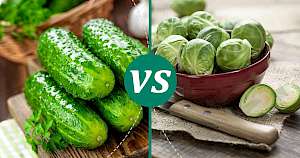Brussels Sprouts vs Cucumber: Nutrition, Calories & Protein Compared


Brussels sprouts vs Cucumber
Nutrition Facts
Serving size:
change
5g10g15g20g30g40g50g60g80g100g120g140g160g180g200g220g250g300g350g400g450g500g600g700g800g900g1000g
1oz2oz3oz4oz5oz6oz7oz8oz10oz12oz15oz20oz25oz30oz35oz40oz50oz
Amount Per Serving:
Serving size:
change
5g10g15g20g30g40g50g60g80g100g120g140g160g180g200g220g250g300g350g400g450g500g600g700g800g900g1000g
1oz2oz3oz4oz5oz6oz7oz8oz10oz12oz15oz20oz25oz30oz35oz40oz50oz
Amount Per Serving:
Brussels Sprouts vs Cucumber 100g Compare
| per 100g | Brussels sprouts | Cucumber |
|---|---|---|
| Calories | 43 | 15 |
| Carbohydrates | 8.95 g | 3.63 g |
| Fat | 0.3 g | 0.11 g |
| Dietary fiber | 3.8 g | 0.5 g |
| Protein | 3.38 g | 0.65 g |
| Calcium | 42 mg | 16 mg |
| Iron | 1.4 mg | 0.28 mg |
| Magnessium | 23 mg | 13 mg |
| Potassium | 389 mg | 147 mg |
| Sodium | 25 mg | 2 mg |
| Zink | 0.42 mg | 0.2 mg |
| Vitaminium A | 754 µg | 105 µg |
| Vitaminium B1 (Thiamine) | 0.139 mg | 0.027 mg |
| Vitaminium B2 (riboflavin) | 0.9 mg | 0.033 mg |
| Vitaminium B3 (Niacin) | 0.745 mg | 0.098 mg |
| Vitaminium B5 | 0.309 mg | 0.259 mg |
| Vitaminium B6 | 0.219 mg | 0.04 mg |
| Vitaminium B9 (Folic acid) | 61 mg | 7 mg |
| Vitaminium C | 85 mg | 2.8 mg |
| Vitaminium K | 177 µg | 16.4 µg |
| Beta karoten | 450 mg | 45 mg |
Discovering the Nutritional Profiles of Brussels Sprouts and Cucumber
When it comes to choosing vegetables for your diet, both Brussels sprouts and cucumbers offer unique benefits and flavors. Brussels sprouts, with their mini cabbage-like appearance, have a slightly bitter and nutty taste that complements many dishes. On the other hand, cucumbers are known for their refreshing and crisp texture, making them a favorite in salads and as a hydrating snack. But beyond their taste and texture, how do these two vegetables compare nutritionally?
Nutritional Breakdown: Brussels Sprouts vs. Cucumber
Understanding the nutritional content of Brussels sprouts and cucumbers can help you make informed decisions about incorporating them into your meals. Here's a closer look at how they stack up against each other:
- Calories: Brussels sprouts contain 43 calories per 100 grams, while cucumbers are much lower at 15 calories. This makes cucumbers an excellent choice for those looking to manage their calorie intake.
- Carbohydrates and Fiber: With 8.95 grams of carbohydrates and 3.8 grams of fiber, Brussels sprouts are a good source of dietary fiber. Cucumbers have fewer carbohydrates (3.63 grams) and much less fiber (0.5 grams).
- Protein: Brussels sprouts also lead in protein content, offering 3.38 grams per 100 grams, compared to cucumbers' 0.65 grams.
- Vitamins and Minerals: Brussels sprouts are rich in vitamins A, C, and K, and provide more iron, magnesium, and potassium than cucumbers. However, cucumbers still offer these nutrients, just in smaller amounts.
What Does This Mean for Your Diet?
Choosing between Brussels sprouts and cucumbers depends on your nutritional needs and taste preferences. If you're looking for a low-calorie option to stay hydrated and refreshed, cucumbers are your best bet. However, for a nutrient-dense vegetable that packs a punch in terms of fiber, protein, and essential vitamins, Brussels sprouts are the way to go.
Both vegetables are versatile and can be enjoyed in a variety of ways. Brussels sprouts can be roasted, steamed, or sautéed, while cucumbers are perfect raw in salads or as a crunchy snack. No matter which you choose, incorporating a variety of vegetables into your diet is key to getting the nutrients your body needs.
Final Thoughts
When comparing Brussels sprouts vs. cucumber, it's clear that both vegetables offer unique nutritional benefits. Whether you're calorie counting or looking to boost your intake of vitamins and minerals, there's a place for both in a balanced diet. So, why not enjoy the best of both worlds and include both Brussels sprouts and cucumbers in your meal planning?
Brussels sprouts 100g
43kcalCalories source
- 69% CARBS.
- 26% PROTEIN
- 5% FAT
Cucumber 100g
15kcalCalories source
- 80% CARBS
- 14% PROTEIN
- 5% FAT
Compares of Brussels sprouts
- Brussels Sprouts vs Artichoke
- Brussels Sprouts vs Arugula
- Brussels Sprouts vs Asparagus
- Brussels Sprouts vs Beetroot
- Brussels Sprouts vs Pepper
- Brussels Sprouts vs Bitter Melon
- see all compares of Brussels sprouts
Compares of cucumber
Read also:
- Calories from Brussels sprouts
- Calories of Butternut squash
- Calories in Cabbage
- Carrot calories per 100g
- Cassava protein per 100g
- How many calories does cauliflower have?
- Calories in a half of cucumber
- Calories in whole cucumber
- Calories for one, two or more cucumbers
- Calories in slice of cucumber
- How much protein in eggplant?
Marcin Piotrowicz
calories-info.com creator
Healthy diet and healthy lifestyle promoter
Add comment